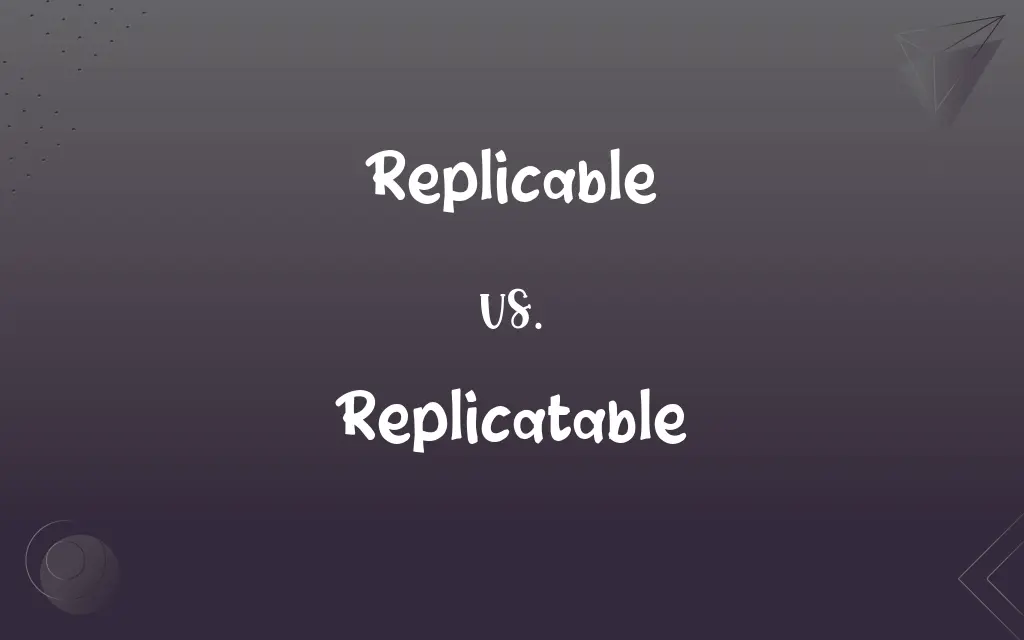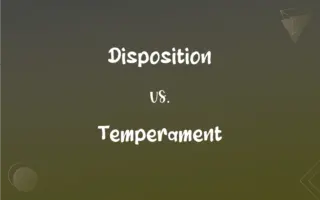Replicable vs. Replicatable: What's the Difference?
Edited by Aimie Carlson || By Janet White || Updated on February 5, 2024
"Replicable" means capable of being copied or reproduced, while "replicatable" refers to the ability to be replicated, often implying a broader or less technical scope.

Key Differences
In discussing "replicable" and "replicatable," both terms share a common root in the idea of replication, yet they subtly diverge in usage and connotation. "Replicable" often appears in scientific and academic contexts, suggesting that an experiment or study can be repeated with the same results by others, thereby emphasizing precision and reliability. "Replicatable," on the other hand, might be used more broadly to indicate that a process or product can be duplicated or reproduced, potentially focusing less on the exactness of the outcome and more on the general ability to replicate.
"Replicable" conveys a sense of exactitude and consistency, essential in fields where reproducibility is a cornerstone of validity, such as in the sciences. It implies a stringent standard, where the conditions and outcomes can be closely duplicated. Conversely, "replicatable" might be employed in contexts where the emphasis is on the feasibility of replication rather than on the precision of the results, suggesting a somewhat less rigorous standard.
In practical application, "replicable" is often preferred when detailing protocols, methodologies, or experiments that require strict adherence to defined parameters for validation purposes. It is a term that underscores the reproducibility of findings under the same experimental conditions. "Replicatable," while also related to the ability to reproduce, might be used in a wider range of contexts, including technology, business models, and software, where the exact replication is desirable but not critical to the core definition.
"Replicable" implies a narrower scope, focusing on the repeatability of specific results within controlled environments. This specificity is crucial in academic and research settings, where the ability to replicate findings underpins the scientific method. "Replicatable," with its broader applicability, suggests that something can be made again or used as a model for duplication, accommodating a wider variety of contexts and outcomes, which may not require the strict controls associated with "replicable."
"Replicable" and "replicatable" both address the concept of duplication but from slightly different perspectives. The former is tightly aligned with scientific rigor and the reproducibility of research, making it a key term in scholarly discourse. The latter, while also relevant to the discussion of reproducibility, allows for a broader interpretation, making it applicable in diverse fields such as business, technology, and art, where exact duplication may not be the primary goal.
ADVERTISEMENT
Comparison Chart
Usage Context
Primarily in scientific research to denote precision.
Broader contexts, including technology and business.
Connotation
Emphasizes exact duplication of results.
Suggests ability to duplicate broadly, not always exactly.
Precision Required
High precision and strict conditions.
Less emphasis on precision, more on general duplicability.
Associated Fields
Science, academia, where reproducibility is critical.
Technology, business, where reproducing concepts is valued.
Implication of Results
Results must be consistently reproducible.
Replication is desirable but may accommodate variations.
ADVERTISEMENT
Replicable and Replicatable Definitions
Replicable
Capable of being reproduced under the same conditions.
The experiment was designed to be easily replicable to verify the findings.
Replicatable
Pertaining to the potential for being reproduced with variations.
The training program was replicatable, albeit with adjustments for local needs.
Replicable
Pertaining to something that can be copied accurately.
The software code was replicable, ensuring a uniform performance across platforms.
Replicatable
Able to be made again or used as a model for duplication.
The software feature was replicatable across multiple operating systems.
Replicable
Relating to the ability to produce an identical outcome.
The recipe was surprisingly replicable, yielding the same flavors each time.
Replicatable
Referring to the ability to create copies or versions that are similar.
The design was replicatable, allowing for customization by end-users.
Replicable
Able to be duplicated exactly.
The study's results were replicable across multiple independent laboratories.
Replicatable
Capable of being replicated or duplicated in some manner.
The success of the business model proved to be replicatable in various markets.
Replicable
Denoting something that can be replicated with high fidelity.
The data model was replicable, facilitating consistent analysis by different teams.
Replicatable
Suitable for reproduction or copying, not necessarily with exactness.
The artwork was deemed replicatable by using digital printing techniques.
Replicable
That can be replicated.
Replicatable
Able to be replicated; replicable.
FAQs
Can a business model be considered replicatable?
Yes, if it can be successfully applied or adapted in different settings or markets.
Is "replicable" used more in academic contexts?
Yes, it's often used in scientific and academic research to emphasize precision and reproducibility.
What does "replicable" mean?
Capable of being duplicated or reproduced exactly under the same conditions.
Can art be replicatable?
Yes, especially when techniques or concepts can be adapted or reproduced in new works.
What does it mean if a product is described as replicatable?
It means the product can be reproduced or duplicated, possibly with some variations.
How do you determine if an experiment is replicable?
By successfully repeating the experiment under the same conditions and achieving the same results.
How is "replicatable" different from "replicable"?
"Replicatable" implies the ability to be duplicated more broadly, not always with exact precision.
Can research findings be both replicable and replicatable?
Yes, if they can be exactly duplicated and also adapted or reproduced in broader contexts.
Are software applications considered replicatable or replicable?
They can be both, depending on whether exact duplication or broader adaptability is the focus.
Can a recipe be replicatable?
Yes, especially if it can be adapted with different ingredients or methods and still achieve similar results.
Does replicatable imply less precision than replicable?
Generally, yes, as it focuses more on the ability to duplicate in a broader sense.
Can methodologies be replicable?
Yes, if they can be followed precisely to produce the same outcomes in research.
Is it easier to achieve replicatable or replicable outcomes?
Replicatable outcomes may be easier to achieve due to the broader scope and allowance for variations.
Does "replicable" require strict adherence to original conditions?
Yes, it typically involves reproducing results under the exact conditions of the original experiment or study.
What is crucial for a study to be replicable?
Precise documentation and adherence to the methodology used in the original study.
Is there a preference for using "replicable" in certain fields?
Yes, fields that value precision and reproducibility, like science and academia, prefer "replicable."
Can replicable studies enhance scientific credibility?
Yes, because they allow independent verification of results, strengthening the scientific evidence base.
Why is replicability important in research?
It ensures the reliability and validity of findings through the ability to reproduce results.
What makes a process replicatable?
The ability to adapt or reproduce the process in various contexts, possibly with adjustments.
Can a technology be both replicable and replicatable?
Yes, technology can be exactly duplicated (replicable) or adapted for different uses (replicatable).
About Author
Written by
Janet WhiteJanet White has been an esteemed writer and blogger for Difference Wiki. Holding a Master's degree in Science and Medical Journalism from the prestigious Boston University, she has consistently demonstrated her expertise and passion for her field. When she's not immersed in her work, Janet relishes her time exercising, delving into a good book, and cherishing moments with friends and family.
Edited by
Aimie CarlsonAimie Carlson, holding a master's degree in English literature, is a fervent English language enthusiast. She lends her writing talents to Difference Wiki, a prominent website that specializes in comparisons, offering readers insightful analyses that both captivate and inform.































































